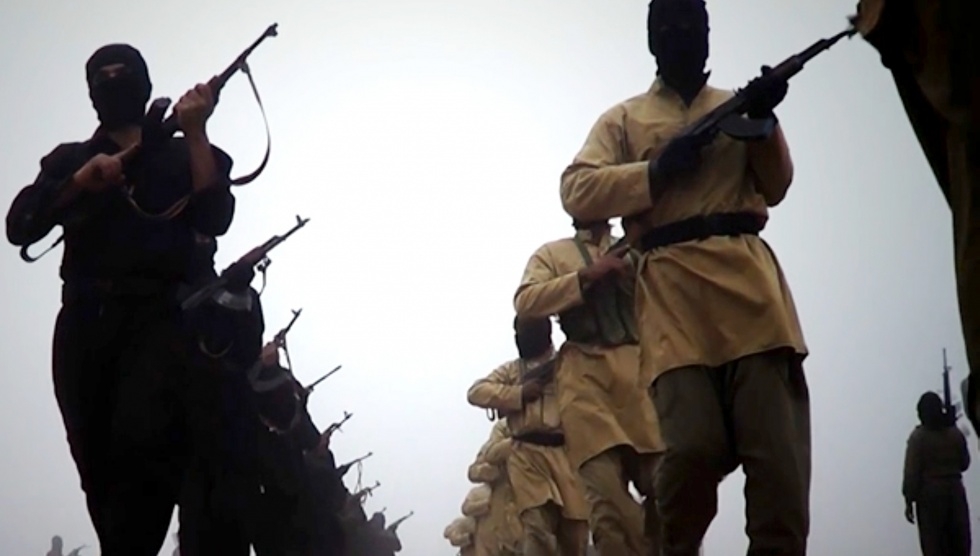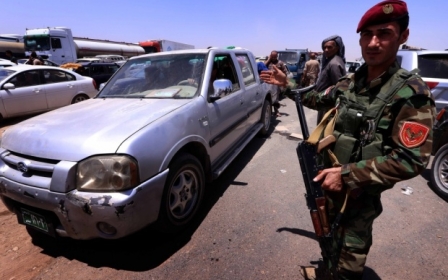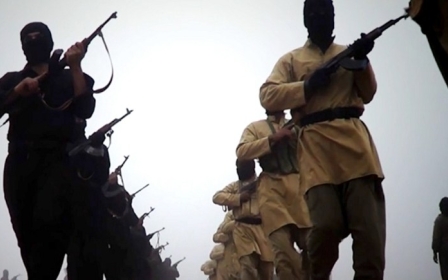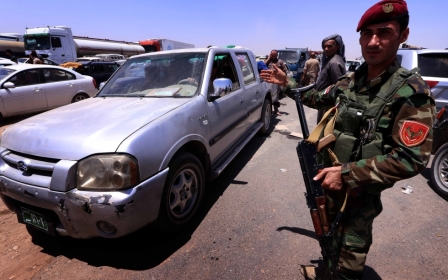Militants tighten grip on Iraq's Mosul, bid to expand further

Militants were firmly in control of Iraq's Mosul on Wednesday, patrolling the streets and calling for employees to return to work a day after seizing the northern city, witnesses said.
Fighters from the Islamic State of Iraq and the Levant (ISIL) overran Mosul and a string of Sunni Arab northern towns on Tuesday, in a major blow to the Iraqi government.
Gunmen, some in military uniforms and others wearing black, stood guard at government buildings and banks, said witnesses reached by telephone from Bashiqa, a town east of Mosul.
They called over loudspeakers for government employees to go back to work.
ISIL said it was behind operations in Nineveh in a series of messages on Twitter. But it is possible that other militant groups have been involved as well.
"The Baathist 'General Military Council' is claiming it played a large role in driving the Iraqi army out of parts of Ninevah province," wrote London-based journalist Eisa Ali.
Some 500,000 Iraqis have fled their homes in Mosul fearing increased violence, the International Organization for Migration said Wednesday.
Iraqi Prime Minister Nouri al-Maliki asked parliament to declare a state of emergency and announced the government would arm citizens to fight the militants.
Soldiers and police had stripped off their uniforms and fled, and the militants used loudspeakers to declare they had "come to liberate" the city of some two million people.
The Turkish consulate in Mosul said ISIL fighters had captured 28 Turkish truck drivers.
A foreign ministry official said Ankara hoped they would be released once they finished unloading fuel oil at a power station.
ISIL takes other areas
Militants also took several mainly Sunni Arab areas in ethnically mixed Kirkuk province, which borders Nineveh, police Colonel Ahmed Taha said.
Taha said security forces abandoned their posts in one area, while an official said soldiers were ordered to withdraw from another, allowing militants to move in.
A similar pattern was followed in Salaheddin province where ISIL militants took control of the Siniyah and Sulaiman Bek areas after security forces pulled out, a senior army officer and a local official said.
Militants have launched major operations in Nineveh, Salaheddin, Anbar, Diyala and Baghdad provinces since Thursday, killing scores and highlighting both their long reach and the weakness of security forces.
"ISIL militants seized control of the municipal council of al-Shurqat town, 300km north of Baghdad, and several police buildings," policeman Omar al-Jabouri told Anadolu Agency.
"The militants have also set free prisoners and set on fire several buildings [in the province]," he added.
According to the policeman, the ISIL militants have taken control of a power plant and a military headquarters in the town of Beiji, 220km north of Baghdad.
Witnesses said that the militants are close to Tikrit, the hometown of former president Saddam Hussein, who was ousted by US troops in 2003.
Local leaders in Iraq's northwestern Diyala province have called on residents to "unite" against ISIL.
"It is important to set up popular committees around the province, especially at night, to stave off the ISIL," Mathni al-Tamimi, head of Diyala's local council, told Anadolu Agency following an emergency council meeting.
Al-Tamimi said the militants may be eyeing Diyala next after seizing Mosul and attempting to capture Samarra earlier this week.
"We fear such a disaster," al-Tamimi said. "That's why we're asking residents to be prepared to resist the ISIL."
US 'committed to preserving the partnership' with Iraq
The United States voiced deep concern about the "extremely serious" situation.
"It should be clear that ISIL is not only a threat to the stability of Iraq, but a threat to the entire region," said State Department spokeswoman Jen Psaki, in a statement.
She stressed that Washington backed "a strong coordinated response to push back against this aggression."
ISIL was drawing "strength from the situation in Syria, from which it transfers recruits, sophisticated munitions, and resources to the fight in Iraq," Psaki said.
US officials in Washington and Baghdad were "tracking events closely in coordination" with the Iraqi government, Psaki said.
"The United States stands with the Iraqi people and the people of Nineveh and Anbar now confronting this urgent threat," Psaki said.
"We will continue to work closely with Iraqi political and security leaders on a holistic approach to diminish ISIL's capacity and ability to operate within Iraq's borders."
The United States has already delivered some 300 Hellfire missiles to Iraqi forces as well as millions of rounds of small arms fire, and thousands of rounds of tank ammunition, helicopter-fired rockets, machine guns, flares and sniper rifles, White House spokesman Josh Earnest said.
"This administration is committed to preserving the partnership that we have with the Iraqi government... There is some assistance that we can provide and have been providing, and we'll continue to do that."
Meanwhile, UN chief Ban Ki-moon was "gravely concerned by the serious deteriorating of the security situation in Mosul," his spokesman said.
New MEE newsletter: Jerusalem Dispatch
Sign up to get the latest insights and analysis on Israel-Palestine, alongside Turkey Unpacked and other MEE newsletters
Middle East Eye delivers independent and unrivalled coverage and analysis of the Middle East, North Africa and beyond. To learn more about republishing this content and the associated fees, please fill out this form. More about MEE can be found here.




